#uk law
Text
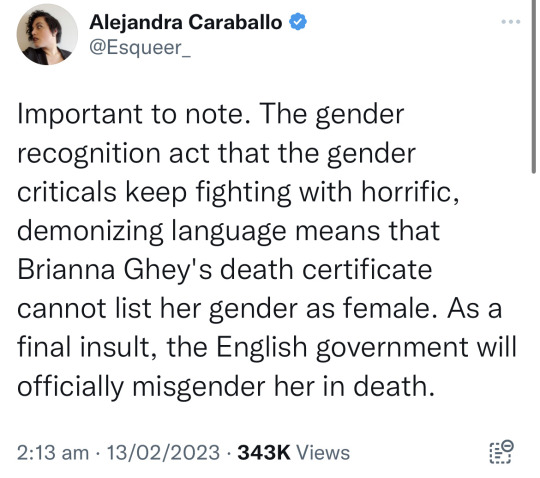
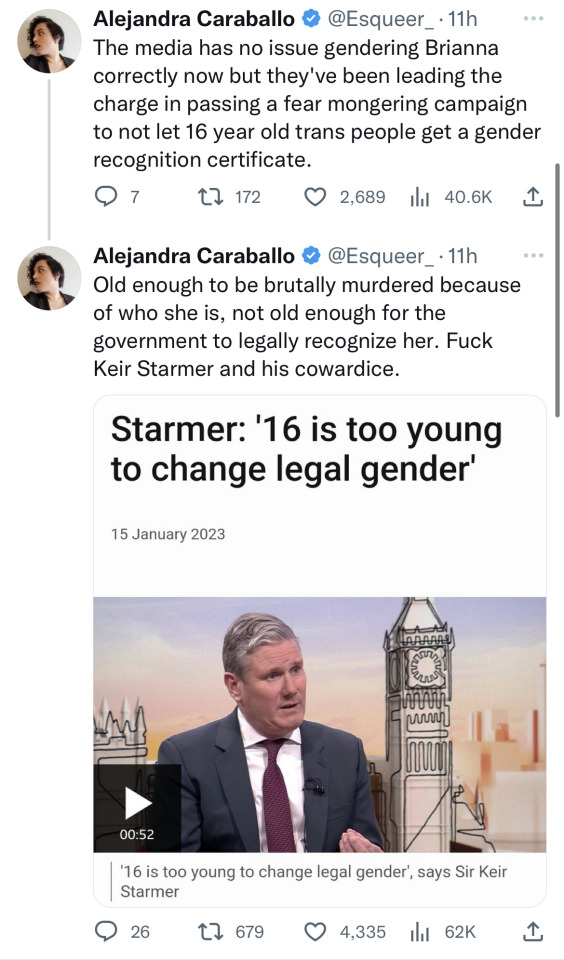
I unusually just share tweets, but given the amount of reblogs I'll edit this one:
INFO Update #1 from @misinfohunter
This is mostly misinformation.
UK law does not require transgender people to have a Gender Recognition Certificate in order to include their correct name and gender on a Death Certificate. However, this is subject to discretion and having a GRC does make the process less complicated.
HREF.LI
There is no English government. England is controlled by the UK government.
Why does England not have its own parliament?
Jack Sheldon, University of Cambridge, provide 'The Basics' on English devolution (or the lack of), explaining why England does not have a p
CENTRE ON CONSTITUTIONAL CHANGE
Sir Keir Starmer did voice the opinion that ‘16 is too young to decide legal gender’ during an interview on January 15th, 2023. This statement was made in reference to Scottish reforms to the Gender Recognition Act.
Starmer: '16 is too young to change legal gender' - BBC News
The UK Labour leader voices "concerns" about the Scottish government's reforms to the process.
BBC NEWS
INFO Update #2 from @momagainstcatboys
this is not true. i understand people are upset and the legislation is legit nightmarish but there is no legal requirement for your gender on your death certificate to match that on your birth certificate, nor do you need a gender recognition certificate. it merely requires that those registering the death note the correct gender with the registrar. obviously this legislation can be applied unevenly and families are bs but it’s important that people know their rights on this, and spreading misinformation helps no-one.
#alejandra caraballo#political twitter#brianna ghey#uk politics#uk law#keir starmer#updated post#updated 17/02/2023
3K notes
·
View notes
Text
Taking Gryffindors and Their Stans to Court
So I thought it would be fun to compile a list of crimes committed by various Gryffindor characters, especially the ones I have seen stans blatantly glorify or condone. This is also fueled by the narrative ignoring how horrific these actions are as well. For each, I will provide the definition of the crime as listed in British law (hyperlink provided in the crime category), cite the guilty parties and cite some of the flimsy defences provided by stans. The characters include, but are not limited to:
Hermione Granger
Weasley twins
Marauders (especially James Potter and Sirius Black)
Rubeus Hagrid
Professor McGonagall
This post will be a work in progress so I will add as I go along. Please feel free to add as well. Also, I am not a legal expert so do not expect these categories to be 100% accurate despite my doing my best. Here I go!
Crime: Sexual Harassment
The Equality Act 2010 says someone sexually harasses another person if they:
Engage in unwanted conduct of a sexual nature and
The conduct has the purpose or effect of either violating the other person’s dignity or creating an intimidating, hostile, degrading, humiliating or offensive environment for them.
Guilty parties: James Potter and other marauders as accomplices (Snape's Worst Memory, Book 5)
But too late; Snape had directed his wand straight at James; there was a flash of light and a gash appeared on the side of James’s face, spattering his robes with blood. James whirled about: a second flash of light later, Snape was hanging upside-down in the air, his robes falling over his head to reveal skinny, pallid legs and a pair of greying underpants.
Many people in the small crowd cheered; Sirius, James and Wormtail roared with laughter.
There was another flash of light, and Snape was once again hanging upside-down in the air.
‘Who wants to see me take off Snivelly’s pants?’
Said by Marauder/James stans:
Snape was a future DE so he deserved it; ie. future criminals/bullies deserve to be bullied before they commit said crime. Someone had to bully Snape.
What James did was not sexual harassment
Snape is a guy so he can't be sexually harassed
I hate Snape so I love seeing him hurt and in pain (perfectly valid reason, we can hate who we want. still listing it though)
Boys will be boys. The marauders are just teenage boys joking around.
In that period, what James did was not illegal
Snape called Lily a mudblood so he deserved it
Snape attacked James so he deserved it
Crime: Kidnapping
The legal definition of kidnapping is to take someone unwillingly and then keep them illegally imprisoned without their valid consent. The latter is normally done with motive, such as financial gain in the form of a ransom.
Guilty parties: Hermione Granger (The Beginning, Book 4)
‘Oh, not electronic bugs,’ said Hermione. ‘No, you see … Rita Skeeter’ – Hermione’s voice trembled with quiet triumph – ‘is an unregistered Animagus. She can turn –’
Hermione pulled a small sealed glass jar out of her bag.
‘– into a beetle.’
Said by Hermione stans:
Rita deserved it for being a sleazy journalist and saying mean things about her and her friends
Rita deserved it by committing a crime first as an illegal animagus. So she has no leverage against Hermione.
Crime: Child Cruelty (Or Child Endangerment/Abuse)
The offence in section 1 of the 1933 Act is committed where a person over the age of 16, who has responsibility for a child under that age, wilfully assaults, illtreats, neglects, abandons, or exposes that child in a manner likely to cause ‘unnecessary suffering or injury to health including any mental derangement’.
Guilty parties: Prof Minerva McGonagall (Snape’s Grudge, Book 3)
Professor McGonagall was so furious with him she had banned him from all future Hogsmeade visits, given him a detention and forbidden anyone to give him the password into the Tower. Poor Neville was forced to wait outside the common room every night for somebody to let him in . . .
Context: An alleged mass murderer (Sirius Black) was on the loose 🫠
Said by McGonagall stans:
She's just strict
Crime: Assault
An assault is any act (and not mere omission to act) by which a person intentionally or recklessly causes another to suffer or apprehend immediate unlawful violence.
Guilty parties:
Rubeus Hagrid (The Keeper of the Keys, Book 1)
He brought the umbrella swishing down through the air to point at Dudley — there was a flash of violet light, a sound like a firecracker, a sharp squeal and next second, Dudley was dancing on the spot with his hands clasped over his fat bottom, howling in pain. When he turned his back on them, Harry saw a curly pig’s tail poking through a hole in his trousers.
...
‘Oh, well — I was at Hogwarts meself but I — er — got expelled, ter tell yeh the truth. In me third year. They snapped me wand in half an’ everything.’
Fred & George Weasley (Back to the Burrow, Book 4 & Snape's Worst Memory, Grawp;Book 5) - two for the price of one lol
Dudley was no longer standing behind his parents. He was kneeling beside the coffee table, and he was gagging and spluttering on a foot-long, purple, slimy thing that was protruding from his mouth. One bewildered second later, Harry realised that the foot-long thing was Dudley’s tongue — and that a brightly coloured toffee-wrapper lay on the floor before him.
‘Yeah, Montague tried to do us during break,’ said George.
‘What do you mean, “tried”?’ said Ron quickly.
‘He never managed to get all the words out,’ said Fred, ‘due to the fact that we forced him head-first into that Vanishing Cabinet on the first floor.’
‘Not until Montague reappears, and that could take weeks, I dunno where we sent him,’ said Fred coolly. ‘Anyway … we’ve decided we don’t care about getting into trouble any more.’
To cap matters, Montague had still not recovered from his sojourn in the toilet; he remained confused and disorientated and his parents were to be observed one Tuesday morning striding up the front drive, looking extremely angry.
Hermione Granger (Felix Felicis, Book 6)
‘Oppugno!’ came a shriek from the doorway.
Harry spun round to see Hermione pointing her wand at Ron, her expression wild: the little flock of birds was speeding like a hail of fat golden bullets towards Ron, who yelped and covered his face with his hands, but the birds attacked, pecking and clawing at every bit of flesh they could reach.
Said by Hagrid stans:
Like with Minerva, I don't see Hagrid stans or regular fans bringing this up. But crimes against the Dursleys are usually justified by the fandom due to their being abusive to Harry.
Said by Weasley twins stans:
The Dursleys were abusive to Harry so Dudley deserved it.
Dudley brought it on himself by eating it. The twins did not force him to eat it.
It was just a joke - harmless fun (for both crimes)
They did not know what the cabinet would do
They did not intend to almost kill Montague
Montague deserved it because HE WAS TAKING HOUSE POINTS (***INSERT RAGE!!!!***)
The twins are just mischievous. They are so funny!
Said by Hermione/Romione stans:
It was just a mistake
Hermione has anger issues. She's just a teenage girl.
Hermione was distraught. She didn't mean it.
Ron deserved it for hurting queen Hermione.
Ron doesn't care so why do you?
Romione is the best HP ship ever. All ships have rough patches.
No matter what Hermione does, I will always ship her with Ron. The other options are not good for her.

I will pause here because I can feel my blood pressure rising. I don't really have beef with anyone, I just don't like seeing these takes on my dash or these responses on my anti blog posts. I have no control over people's opinions and I doubt more than a handful of people care about mine.
Will continue next time on Taking Gryffindors and Their Stans to Court!
PS. All attempts to deflect by pointing the finger at other characters like Draco Malfoy, DEs, Severus Snape etc will be ignored. This is about JKR's darlings who apparently can do no wrong and the stans who shamelessly justify violence.
#anti gryffindor#anti gryffindor stans#anti james potter#anti marauders#anti hermione granger#anti minerva mcgonagall#anti professor mcgonagall#anti hagrid#anti rubeus hagrid#anti weasley twins#anti fred weasley#anti george weasley#uk law#harry potter books#harry potter series#harry potter and the philosopher's stone#harry potter and the goblet of fire#harry potter and the order of the phoenix#harry potter and the prisoner of azkaban#dudley dursley#severus snape#snape deserved better#slytherins deserved better#dudley deserved better#even kid bullies don't deserve to be terrorized like dudley#rita skeeter#graham montague#Taking Gryffindors and Their Stans to Court#anti romione#ron weasley deserved better
38 notes
·
View notes
Text
https://vt.tiktok.com/ZSRvVv8c4/
#elon musk#twitter#chief twit#employment law#uk#uk employment law#uk law#law#redundancies#elon done fucked up
187 notes
·
View notes
Text
Greta Thunberg goes on trial over London oil industry protests #climate #activism #ukpol #Uklaw The Swedish climate campaigner was one of five activists at Westminster magistrates court charged with “failing to comply with a condition imposed under section 14 of the Public Order Act” after they were told to leave the area.
#greta thunberg#london#climate change#activism#ukpol#uk law#1312#all cops are bastards#all cops are bad#ftp#fuck the police#fuck the cops#anti police#anti cop#uk politics#uk police#uk#uk government#uk govt#ukgov#class war#climate crisis#climate action#climate catastrophe#climate emergency#climate collapse#climate chaos#antinazi#antiauthoritarian#antifa
11 notes
·
View notes
Text
hey!
my name’s K, nice to meet you! i’m a student in the uk studying law with german. this account exists to help me document and hold myself accountable to my studying.
i’m hoping to use this space to show notes, analyse case law, and make some study friends!
(there’s list of modules i’m studying/have studied under the cut — for any uk law students about)
tumblr maybe isn’t the typical place for educational content, but i’ll do my best to make it work, and i hope some people come along with me 😊
📚📚📚📚
studying…. 📖
📝 contract law
🏡 land law
already studied 📕
🗂️ legal and criminal systems
🚨 criminal law
🗞️ tort law
⚖️ equity and trusts
(i’ll probably focus more on the law than the german half of my degree — but i do study both and my third year will be abroad, so i need to brush up on my german quite a bit before then)
i hope to see you around!
3 notes
·
View notes
Text

Reading this in preparation for starting Uni in October.
Surprisingly I found that I really like Tort.
Ivan
#law school#lawblr#law student#open university#study motivation#uk law#study hard#studyblr#Mature stdent#twins
4 notes
·
View notes
Text
As I understand it, the fine print of British laws use the pronouns he/him in the majority of cases. It was considered a landmark moment when, a few years ago, she/her was used on a single document. This means one of two things:
Laws do not apply to women and non-binary people
He/him are pronouns which have nothing to do with gender, and can be applied to any and all individuals
Either answer would make the tories incandescent with rage, and therefore suits me perfectly
6 notes
·
View notes
Text
I just saw Max Fosh's newest video and I gotta know the backstory behind the following law:
No Trespassing (Unless You’ve Climbed A Tree To Point At A Fish) - Cornwall, 1603 (Bylaw)
#Max Fosh#law#laws#UK laws#UK law#UK#United Kingdom#England#uk history#law history#history#social experiment#help#need backstory#cornwall#bylaw#1603#no trespassing#trespass#trespasses#trespassing
4 notes
·
View notes
Text

So while the press (and it's owners), the Tories and mr Partygate himself kept Britain focused on Partygate and electricity bills, the British were quietly muted by law. What other laws have quietly been passed during this period? Time for a General Election to tidy up?
All nuisance in Britain is hereby considered a crime... 🤔😳
https://www.huffingtonpost.co.uk/entry/anti-protest-bill-wins-vote_uk_6051ac29c5b6264a8fb800ba
youtube
youtube
#uk politics#uk law#nuisance act 2022#politics#knowledge#no human rights#university memes#human rights#worldwide#fun facts#just sayin'#Youtube#mustsee#partygate#boris jonhosn
4 notes
·
View notes
Text
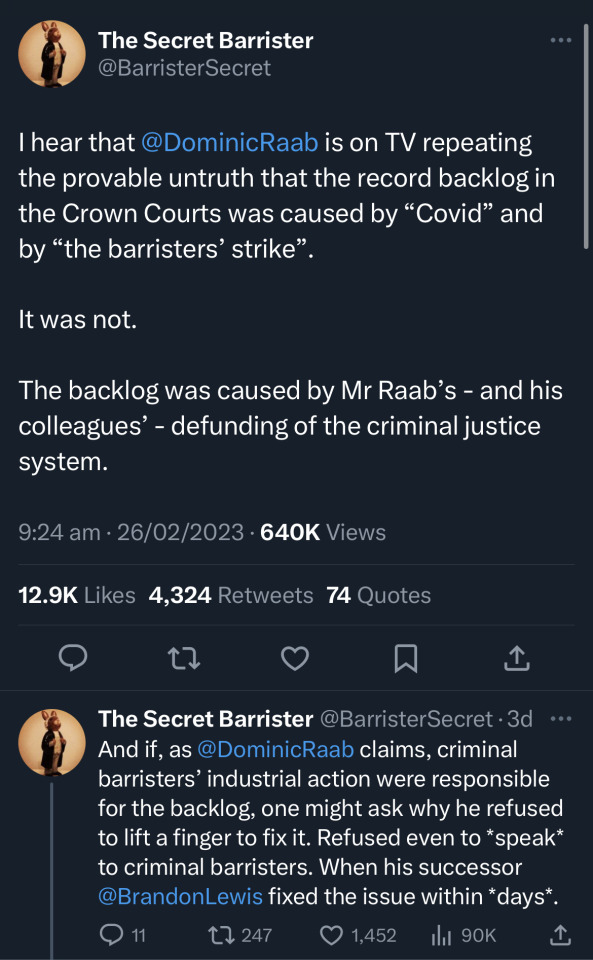

#the secret barrister#political twitter#dominic raab#brandon lewis#uk law#uk news#uk politics#conservative party
78 notes
·
View notes
Text
Enforcing Covenants in Leases: An Exploration of Old and New Laws
Understanding the dynamics of landlord and tenant relationships requires delving into the intricacies of land law, encompassing Real Property law and Conveyancing. Historically, covenants originated in contract law before being integrated into land law. Notably, leases pre-1925 were considered personal property.
Distinguishing Factors: While contract law operates under the principle that only…

View On WordPress
#Conveyancing#Enforcing Covenants in Leases#Impact on Subletting#jamaica law#Old and New Laws#Privity of Contract#Privity of Estate#Property law#UK Law
0 notes
Link
Nevertheless, the trial itself arguably added to the gaiety of the nation, as Laurence discoursed on the discourse, and claimed to have been offered a role in The Batman before his career was derailed. That remains unverified, though I can definitely see him playing one of the guys who kill Bruce Wayne’s parents. As for Fox’s claim that he had been approached for a part in Succession … Clearly, it’s a huge honour for a show like Succession to find itself woven into Laurence’s spellbinding “before” story. Even so, it must be said the idea he was up for a part in it was certainly eye-catching news, most particularly to those behind Succession. No one had any memory of such a thing. Was it remotely possible that at some point he had appeared on a British casting assistant’s longlist? It’d have to have been a very long list, seems to be the polite answer. “We definitely talked about him a lot in the writers’ room,” one writer reflects. “Just not in connection with a part …”
Yet despite all his humiliations and defeats, Laurence Fox’s essential ridiculousness and poignantly insatiable need for attention confine him to the comic spectrum as opposed to the tragic. He is more of a Malvolio than a Macbeth. Shortly after his fateful appearance on Question Time, Laurence boasted to the Sunday Times of having been the only person to have turned up for an appearance on QT “with guitars and shit”. Even now, I am unable to type that without laughing.
Marina Hyde is one of my favorite writers, especially when it comes to cutting an imbecile down to size. In the U.S. we don’t know or care about Laurence Fox. He’s just one anonymous Brexit dumbbell among many. But you don’t need to know anything about whoever he is to appreciate Hyde’s smart, sharp vivisection of a failed actor who subsequently succeeded at becoming a failed politician, finishing in sixth place in an election for Mayor of London, with 1.9% of the vote.
1 note
·
View note
Text
Case Reading: Street v Mountford
Key Topic: Leases and Licences; Land Law
Read with me: Street v Mountford [1985] AC 809
Disclaimer that this is my interpretation of the case, not to be taken as definitive fact, and not legal advice. I have not included every aspect of this case, only the parts I deem essential for my own notes.
This case, held in the House of Lords, is the authority for the three elements distinguishing a lease from a licence, these being a defined term, payment of rent, and exclusive possession.
What Happened? —
Street (S) allowed Mountford (M) to occupy two rooms for £37 per week, subject to conditions set out in a written agreement. This was titled "Licence Agreement" and included a declaration signed by M, that she understood that it did not give her a tenancy protected by the Rent Acts. Later that year, S sought an order in the county court to determine if it was a tenancy (lease) or a licence.
This distinction matters because it affects the rights given to the occupier. If M had a lease, she would have acquired a legal leasehold estate in the land, and the law would give her occupation greater protections, such as through the Rent Acts. If instead it was a licence, these protections wouldn't apply.
In the county court, it was deemed a lease, then appealed to the Court of Appeal who deemed it a licence, then appealed to the House of Lords here.
The House of Lords determined that it was a lease, despite the title and declaration included within the agreement.
Why Is It Important? —
This case is the leading authority for two essential parts of land law:
1. There are three elements that distinguish a lease from a licence: a defined period of time of occupancy; a payment of rent; and exclusive possession of the land, where the occupier has the right to exclude anyone - including the landlord - from being on the land.
Other cases since have elaborated on the specific meaning and application of these elements; some of these will be discussed briefly below.
2. The distinction between a lease and a licence is based on the consequences of the agreement, not the parties' intentions.
An agreement satisfying all requirements of a tenancy creates a tenancy, even if the contracting parties insist they intended to create a licence.
Quotes —
These are taken from the speech given by Lord Templeman in his judgement.
"there is no doubt that the traditional distinction between a tenancy and a licence of land lay in the grant of land for a term at a rent with exclusive possession"
"To constitute a tenancy the occupier must be granted exclusive possession for a fixed or periodic term certain in consideration of a premium or periodical payments"
= Gives the three elements of a lease
"any express reservation to the landlord of limited rights to enter and view the state of the premises and to repair and maintain the premises only serves to emphasise the fact that the grantee is entitled to exclusive possession and is a tenant"
= Exclusive possession is not invalidated by the landlord having some limited rights to access the land
"the consequences in law of the agreement, once concluded, can only be determined by consideration of the effect of the agreement. If the agreement satisfied all the requirements of a tenancy, then the agreement produced a tenancy and the parties cannot alter the effect of the agreement by insisting that they only created a licence"
"Parties cannot turn a tenancy into a licence merely by calling it one"
"the only intention which is relevant is the intention demonstrated by the agreement to grant exclusive possession for a term at a rent"
= The parties had the right to contract on whatever terms they chose, but the consequences are decided by the effect of that agreement, not their intentions
Further Reading —
Lace v Chantler 1944 = occupancy for "the duration of the war" was not sufficiently certain, as the parties did not know at the time when that would be
Prudential Assurance Co Ltd v London Residuary Body 1992 = a tenancy which runs week-to-week or month-to-month is deemed certain, because those individual periods are certain in length
Antoniades v Villiers 1990 = terms of an agreement will be looked at in context; a term which stated that the landlord could stay whenever he wished was not evidence of a licence, because it was extremely unlikely he would actually have ever done so
Manchester CC v National Car Parks Ltd 1982 = exclusive possession requires access to the land at all times of the day
__
I will probably make more notes on this case at some point as my upcoming assessment relates to leases and licences
__
#uk law#law student#uk land law#land law#leases and licences#my case readings#my case readings land#study with me
0 notes
Text
UK Supreme Court rules AI cannot be patent “inventor”
On Wednesday, a US computer scientist lost a bid to register patents for inventions created by his artificial intelligence system in a UK landmark case on whether AI can own patent rights, Reuters reported.
Stephen Thaler wanted to obtain two patents in the UK for inventions he claimed were invented by his “creative machine” called DABUS. His attempt to register the patents was rejected by Britain’s Intellectual Property Office on the grounds that the inventor must be a person or company, not a machine.
Thaler appealed to the UK Supreme Court, which on Wednesday unanimously rejected his appeal, because under UK patent law “an inventor must be a natural person.”
Judge David Kitchin said in the court’s written ruling:
This appeal is not concerned with the broader question whether technical advances generated by machines acting autonomously and powered by AI should be patentable.
Read more HERE

#world news#world politics#news#europe#european news#supreme court#uk supreme court#uk politics#uk news#uk government#england#london#united kingdom#uk law#ai generated#artificial intelligence#thaler
1 note
·
View note
Text
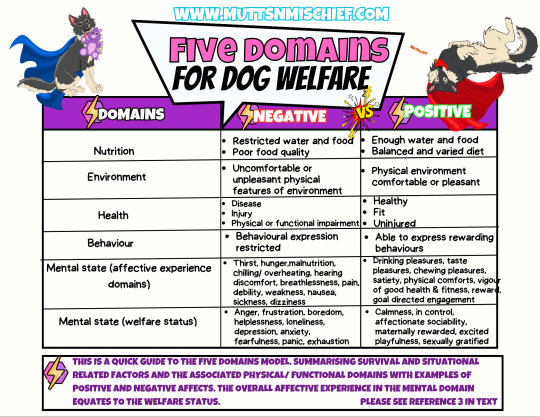
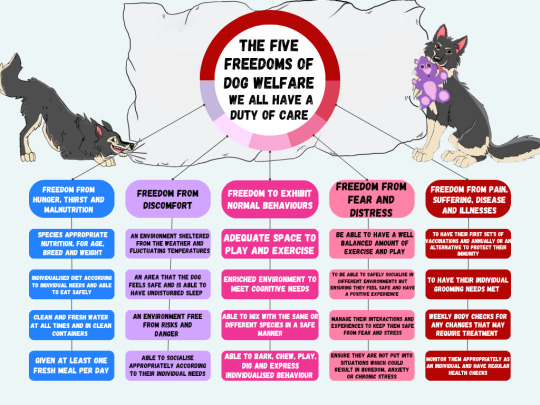
Freedom from pain, suffering, disease and illnesses - one of the five freedoms of the Animal Welfare Act 2006 UK
Under the Animal Welfare Act all Animals have the rights to:
Freedom from hunger, thirst or malnutrition
Freedom from discomfort
To be able to exhibit normal behaviours
Freedom from fear and distress
To be protected from pain, suffering, disease and illnesses.
As it is such a big topic I'll explore each freedom within each blog.
Freedom from pain, suffering, disease and illnesses. This is another big one for me. One of the most misunderstood needs when addressing a change in behaviour is working through a process of elimination, beginning with a Vet check to rule out pain and illness as this can and does cause changes in behaviour.
Many guardians think that a booster appointment is the same as a Vet check. It isn't. Within a Vet check we are potentially looking at a full cbc (complete blood count) tweaked as needed for the individual dog so the blood test may actually be looking for more. A urinalysis to rule out any problems with the kidneys and liver or is there any information from the urine during analysis.
Your annual check up may look different if you have a senior dog, where further tests are done such as a cbc and urinalysis for example.
However in the years before the senior years, if you book an independent full vet check or wellness exam, you may already be aware that as well as checking over the body, they will listen to the heart and the lungs, take their temperature, check their pulse rate and respiratory rate. Feel the abdomen and limbs, check their teeth, eyes and ears. They may also take your dog's weight or do a body score. They may also do a rectal exam and check that there are no problems with the anal glands, they may also check their reflexes and watch their movements around the consultation room for a gait analysis. They may also do faecal exams, heartworm tests and possibly give parasite prevention if you purchase this from the vets.
The vet may also ask you about their routine and diet, so the vet can establish what is normal for your individual dog.
If your dog appears unwell or there is a change in behaviour you may find that they need to then explore a cbc and look at other diagnostic tests which can include the above or more depending on your individual dog.
When we advise guardians to have a Vet check when there is a behaviour change, many guardians say that they have just had their boosters so they don't understand why we are recommending a Vet check. This is on all of us as professionals to guide guardians through the above expected process for their dogs health and well being.
Working holistically we can also pull in the services and help across a multidisciplinary team of a nutritionist, hydrotherapist, canine chiropractor, physio, groomer and homoeopaths.
It is clear that it isn't the fault of anyone if a dog is taken ill or injured and that just like for humans being unwell or injured is a part of life.
However the five freedoms brought attention to the avoidance of negative welfare states which can reduce the likelihood of illness, disease and injury. By improving welfare standards, for example Vaccinations, titre tests, health screening and scores, keeping dogs indoors (as opposed to residing outdoors),with a highly nutritious diet, access to fresh water and in a safe environment was the first step in reducing the risk.
It was also identified within the five freedoms that affects and affective states also contribute to the unwellness or imbalances to the internal physical and functional wellness of animals. If you refer back to this blog: Freedom from distress you can read more about affects and affective states. https://www.facebook.com/100057373879884/posts/pfbid0sSymRUa7GdcdHYvMmebQkAM5rBUQKcgL1bGBmPFcJL78qnJpKnvPuY9j8LfeoE6Ul/
There is also another negative affect, which can affect dogs' health and wellness, which are the negative emotions that dogs can experience such as fear, anxiety, panic, frustration, anger, helplessness, depression, boredom and loneliness. The negative emotional states can cause unwellness in dogs just like it does with us. This has been evidenced by the sciences of neuroscience, behavioural and physiological. (2) Remembering that dogs also have mental health needs like us and can become physically unwell due to poor mental health.
So when a behaviourist begins by building a history form and a consult with lots of questions which can sometimes feel time consuming or irrelevant, it is because of the model of the five domains. To understand your dog as an individual in order to understand the why of the behaviour. Much like calling 111 and the speaker says “some of these questions may seem irrelevant.”(3)
It is also really important that we note within this freedom that there is a difference between surviving and thriving. For example the absolute minimum of keeping a dog alive and allowing them to thrive. For example puppy mills, where the dogs are given the absolute minimum to simply stay alive, we know that these dogs and their puppies are absolutely not in a state of thriving.
It is also important to note that dogs can be chronically over or underfed, exposed to bad and or extremes of weather, suffer with chronic injuries or infections and still be alive. (4)
It's important to understand that the phrase “when you know better you do better” is kept in mind here, my intention is not to offend or upset anyone, nor for anyone to feel bad. I raise this awareness and share this knowledge so that you have access to it.
I feel as a professional I have a duty of care to enable guardians and colleagues as much as possible, to have as much knowledge as possible. This will only enable better dog welfare when you have this information in a summarised and easy to understand format for everyone.
Many guardians and in fact professionals do not have this knowledge, nor do they know what to ask a Vet for, within a full health check and there is no shame in that. It is not easy to find this information and have it in terms that are not clinical.
Hopefully by sharing this knowledge you now feel you have a much wider understanding and can educate friends, family and colleagues about their own animals they share their home with.
If you are ever concerned about the welfare of someone's animal within the UK please contact the RSPCA https://www.rspca.org.uk/utilities/contactus/reportcruelty this will take you to a landing page to signpost you to the relavent service. The RSPCA is often overwhelmed with calls nationwide so utilising the website and even their chat button can help them to learn of your concern and take measures to further contact you. You can report concerns anonymously.
In the next and final blog concerning the Five freedoms I will be wrapping up with a summary and how we can help dogs now, with small changes!
References
1. Broom D.M. Cognitive ability and awareness in domestic animals and decisions about obligations to animals. Appl. Anim. Behav. Sci. 2010;126:1–11. doi: 10.1016/j.applanim.2010.05.001.
2. Panksepp J. Affective consciousness: Core emotional feelings in animals and humans. Conscious. Cogn. 2005;14:30–80. doi: 10.1016/j.concog.2004.10.004. Gregory N.G. Physiology and Behaviour of Animal Suffering. Blackwell Science; Oxford, UK: 2004.
Mellor D.J., Beausoleil N.J. Extending the ‘Five Domains’ model for animal welfare assessment to incorporate positive welfare states. Anim. Welfare. 2015;24:241–253. doi: 10.7120/09627286.24.3.241.
McMillan F.D. Maximising quality of life in ill animals. J. Am. Anim. Hosp. Assoc. 2003;39:227–235. doi: 10.5326/0390227.
Mellor D.J., Beausoleil N.J. Extending the ‘Five Domains’ model for animal welfare assessment to incorporate positive welfare states. Anim. Welfare. 2015;24:241–253. doi: 10.7120/09627286.24.3.241.
3. Edgar J.L., Mullan S.M., Pritchard J.C., McFarlane U.J.C., Main D.C.J. Towards a ‘good life’ for farm animals: Development of a resource tier framework to achieve positive welfare for laying hens. Animals. 2013;3:584–605. doi: 10.3390/ani3030584.
4. Mellor D.J. Animal emotions, behaviour and the promotion of positive welfare states. N. Z. Vet. J. 2012;60:1–8. doi: 10.1080/00480169.2011.619047.
Appleby M.C., Mench J.A., Olsson J.A.S., Hughes B.A., editors. Animal Welfare. 2nd ed. CAB International; Wallingford, UK: 2011.
Grandin T., editor. Improving Animal Welfare: A Practical Approach. 2nd ed. CAB International; Boston, MA, USA: 2015.
Webster J., editor. Management and Welfare of Farm Animals. UFAW Farm Handbook. Wiley-Blackwell; Chichester, UK: 2011.
#dogs#dogtraining#dogsofinstagram#dogsofinsta#dogsoftiktok#fivefreedoms#dogtrainers#dog training#dog behaviour modification#dog behaviour#animal welfare#uk law#dogwelfare#holistic dog training#holistic behaviour modification#dogs of tumblr
0 notes